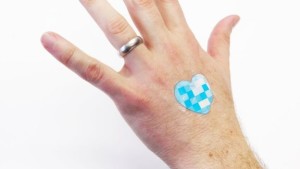 The cosmetics firm L’Oreal is not one you’d expect to see at a CES, which skews heavily to the electronic. Yet here is Guive Balooch, Global VP of its Technology Incubator, sitting with MC10 Co-founder Roozbeh (“Rooz”) Ghaffari, both of them sporting blue heart-shaped stickers on their hands.
The cosmetics firm L’Oreal is not one you’d expect to see at a CES, which skews heavily to the electronic. Yet here is Guive Balooch, Global VP of its Technology Incubator, sitting with MC10 Co-founder Roozbeh (“Rooz”) Ghaffari, both of them sporting blue heart-shaped stickers on their hands.
Those stickers, they explain, track exposure to the sun, but do it in two particularly connected ways. The ink, Balooch explains, is sensitive to UV exposure; if you take a picture of it with an app, the app can report how much sun you’ve taken.
But there’s more. The stickers, Ghaffari says, are about 50 microns thick, flexible and stretchable, conforming to the skin, and conceal NFC circuitry. Tap a smartphone to it, and the app can report the same information as it would have done with the photo.
Balooch said the patches would be distributed for free later this year, although it was not yet certain when or via which channel. Information gathered by the patches, subject to privacy laws and consent, could be used to help understand how long L’Oreal’s customers spend in the sun, and when and where. The patch is washable, and has an expected life of five days.
L’Oreal, Balooch said, sees itself as less a cosmetics company and more a beauty company, which embraces everything to and including the development of artificial skin.
(For more coverage of CES 2016, please click on the “CES2016” tag close to this article.)